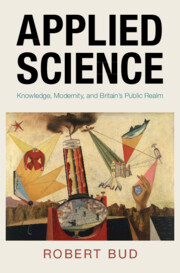Book contents
- Applied Science
- Science in History
- Applied Science
- Copyright page
- Dedication
- Contents
- Figures
- Acknowledgements
- Introduction
- Stage 1 Origins and Pedagogy in the Nineteenth Century
- Stage 2 Research in the Early Twentieth Century
- 4 The Dawn of the Twentieth Century
- 5 From the Magi to Industrial Function
- 6 ‘Western Civilisation’ and Applied Science
- Stage 3 After World War Two
- Archives Used
- References
- Index
4 - The Dawn of the Twentieth Century
from Stage 2 - Research in the Early Twentieth Century
Published online by Cambridge University Press: 15 March 2024
- Applied Science
- Science in History
- Applied Science
- Copyright page
- Dedication
- Contents
- Figures
- Acknowledgements
- Introduction
- Stage 1 Origins and Pedagogy in the Nineteenth Century
- Stage 2 Research in the Early Twentieth Century
- 4 The Dawn of the Twentieth Century
- 5 From the Magi to Industrial Function
- 6 ‘Western Civilisation’ and Applied Science
- Stage 3 After World War Two
- Archives Used
- References
- Index
Summary
At the beginning of the twentieth century, the dominant reference of applied science changed. This chapter addresses the question: How could research be discussed using the old language of applied science previously used principally for pedagogy? Where was the continuity? The term’s meaning was constructed and reconstructed with the new organisations, such as the National Physical Laboratory and the newly incorporated civic universities. Therefore, the hectic emergence of a host of new organisations and awareness of research is of particular interest. In an era of growing foreign competition, Liberal politicians such as R. B. Haldane put their faith in applied science. Three key themes structure the analysis: the challenge of foreign powers, the growth of institutions, and the attraction of applied science to governments committed to maximising national efficiency but minimal interference in the market. The focus is on the years between 1899 and the outbreak of war.
Keywords
- Type
- Chapter
- Information
- Applied ScienceKnowledge, Modernity, and Britain's Public Realm, pp. 93 - 117Publisher: Cambridge University PressPrint publication year: 2024



